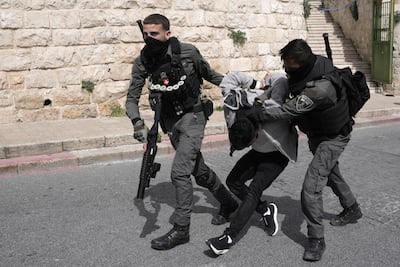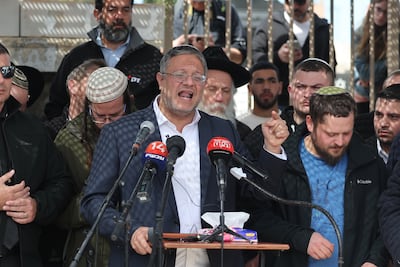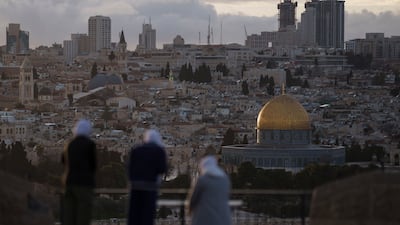Live updates: Follow the latest news on Israel-Gaza
Jordan warned Israel on Monday against “messing” with Al Aqsa Mosque and other holy places in Jerusalem amid heightened tension as Ramadan began against the backdrop of the war in Gaza.
Israel has posted extra security in Jerusalem for Ramadan, during which Muslim Palestinians usually gather for prayers at the mosque.
The Israeli cabinet rejected suggestions from far-right ministers to impose new restrictions on the number of worshippers visiting the mosque.
Vague restrictions are in place, including undefined limits on the number of worshippers who can pray at the mosque, particularly on Fridays, and measures to block access for young people.
“Messing with the holy places is playing with fire,” Jordan's Foreign Minister Ayman Safadi said, as he called for Israel to lift the existing restrictions.
They “prevent people from performing their religious obligations in these holy days”, he said, including “restricting the freedom to reach Al Aqsa Mosque”.
“Ramadan is the month of mercy and peace and calm. Sadly this is not the reality,” Mr Safadi said after meeting Cardinal Paul Gallagher, the Vatican's secretary for relations with states, in Amman. “These are difficult times.”
Cardinal Gallagher also met King Abdullah and repeated the Vatican's calls for a ceasefire in Gaza.
The Royal Palace quoted the king as telling him that any “explosion of the situation” in Jerusalem “will have dangerous repercussions”.

Al Aqsa has been a major flash point in the Palestinian-Israeli conflict, especially since Israel occupied the site in the 1967 Arab-Israeli war. The compound is holy for both Muslims and Jews.
Jordan claims custodianship over Al Aqsa and other holy sites in East Jerusalem. The kingdom administered the area for two decades before it was captured by Israel.
In 2021, Israeli restrictions at the site sparked violence that led to an 11-day war between Israel and Hamas, the militant group supported by Iran that has ruled Gaza since 2007.
Hamas named its attack into southern Israel on October 7 last year, which sparked the current war in Gaza, after Al Aqsa.
Israel has given mixed signals about how its security forces will treat worshippers in Jerusalem during Ramadan.
Israeli police assaulted a crowd of Palestinian worshippers around Al Aqsa compound on Sunday.

But on Monday, the Muslim Quarter in the city was relatively busy with people peacefully shopping.
Earlier in the day people were sitting on the steps around Damascus Gate, the main entrance to the Muslim Quarter, where Palestinians often protest and clash with Israeli forces.
Throughout the war, Israeli authorities have not allowed people to gather in the area.
The apparent change in policy, alongside an ease in access for Palestinians to the Old City, has raised hopes that Israel may tread cautiously and look to ease tensions in Jerusalem over Ramadan.
According to Israeli media reports during previous weeks, large parts of the security establishment prefer a limit on restrictions to avoid tensions escalating.
However, far-right National Security Minister Itamar Ben-Gvir has pushed for the government to impose severe measures on Muslims during Ramadan.
Mr Ben-Gvir has control of the police and has advocated for Al Aqsa compound to be brought under Israeli control.
He has publicly called for the imposition of unprecedented restrictions to prevent Israeli Arabs below a certain age from accessing the compound, a move that critics have warned could ignite tensions in the city.


